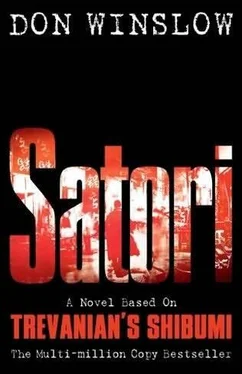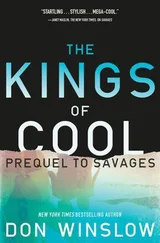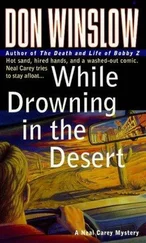If I have guessed right, Nicholai thought, I might become a wealthy man.
If I have guessed wrong, I will certainly be a dead one.
KANG SAT BACK and savored his Dragon Well tea – the finest in China, supplied only to Mao and himself – as he regarded the Tang Dynasty painting on the wall. The overall effect was sublime, so Kang was more than annoyed by the interruption.
What was that mao-tzi Voroshenin doing here after midnight?
Kang sighed and gave permission to allow him in. Then he put a smile on his face and walked out to greet his unwanted and uninvited guest.
“An unexpected pleasure,” Kang said.
Voroshenin caught the tone. “It’s urgent.”
“Apparently,” Kang said. “Please come in.”
Kang walked him into the large sitting room, which was filled not only with paintings but also with bronzes, rare ceramics, and ancient seals, all liberated from the former possessing classes. His collection of fine art was worth many thousands of yuan; his assemblage of erotica only slightly less valuable in terms of money, far more precious in the influence it purchased with Mao, a fellow enthusiast.
Had Voroshenin, the poor lonely fellow, come on some pretext to see if there was new pornography? The Russian looked at the Tang painting, a classically formed depiction of a southern mountain.
“New?” he asked.
“Do you like it?”
“It’s good.”
The mao-tzi wouldn’t know good from garbage, Kang thought. That being the case, he didn’t offer him tea – which anyway wouldn’t be appreciated – but some rice wine instead. The Russian was an incipient drunkard, it would sooner or later kill him, and Kang hoped it was sooner.
The drink having been offered and accepted, the Russian said rudely, “Quite an art collection you have here.”
Kang didn’t like the smirk on his face. “I do what I can to preserve our cultural treasures,” he said, “at least the ones not already stolen by Europeans.”
They both knew that the best collections of Chinese art were to be found in the Hermitage and the Louvre. One day, Kang thought, we shall get them all back. “You said something about an urgent matter.”
“What if,” Voroshenin said, “Liu could be linked to the Americans?”
“What if shit were gold?” Kang responded.
“What if,” Voroshenin countered, “Guibert were made to say that this arms shipment to the Viet Minh was a sham, to cover up something else?”
“Such as?”
“What if he were to confess,” Voroshenin asked, carefully selecting his words, “that the weapons were not for the Viet Minh, but were to be diverted to counterrevolutionaries in Yunnan instead?”
“Then I am very much afraid,” Kang said, “that would implicate General Liu in an imperialist plot to overthrow the People’s Republic. The Chairman would be shocked and heartbroken, of course.”
It was a delightful thought. Kang had been searching for years for a pretext to arrest Liu, one that the army and public would accept, and this dissolute Russian might just have handed it to him.
“But why would Guibert confess to something like that?” Kang asked, his eyes alight with wry amusement. Actually, he could think of a dozen reasons – “Toads Drinking,” “Monkeys Holding a Rope,” “Angel Plucking a Zither,” or perhaps some new technique that had yet to be discovered or named. “And how are the Americans involved in this?”
“Guibert,” Voroshenin answered, “is actually an American agent named Nicholai Hel.”
He told Kang what he knew of the Guiberts and of Nicholai Hel, omitting, of course, his own past with Alexandra Ivanovna.
“Do we know this for a fact?” Kang asked.
“No,” Voroshenin admitted. “But I’m reasonably sure.”
“ ‘Reasonably sure’ is not good enough,” Kang said. “I can’t arrest a foreign national on ‘reasonably sure,’ torture him, and then find out that he really is this Michel Guibert. Even the French might object to that.”
It is tempting though, Kang thought, so tempting. The thought of parading an American spy down to the Bridge of Heaven and having him shot… The titillating image of that bastard Liu following him a few days later… It would solve so many problems. But this “Guibert-Hel” connection – it was tenuous at best.
“What would you need?” Voroshenin asked.
Kang leaned back and thought about it for a few moments. “Perhaps if the father were to tell us this is not his son…”
NICHOLAI ROSE BEFORE DAWN, performed ten “Caged Leopards,” and then got dressed to go out for his morning run.
The very real prospect that this might be his last morning sharpened the air, brightened the colors, and lifted the mundane sounds of the city’s waking to the level of a symphony. The rumbling of a truck engine, the jingling of a bicycle bell, the clatter of a trash can being dragged across the pavement all had a clear, crystalline beauty that Nicholai appreciated for the first time.
The trees, then, took on a startling fresh beauty, artful compositions of silver, white, and black, delicately and perfectly balanced, changing tones with the gathering light. The ice on the lake reflected their images back to themselves as a friend reveals to a friend his best qualities.
The morning was truly beautiful, the tai chi players truly beautiful, China itself was truly beautiful and Nicholai realized with some sorrow that he would miss it all if he should, as was probable, die tonight.
But that is tonight, he thought, and this is this morning, and I am going to enjoy every moment of it.
As he ran onto the arched bridge to the Jade Isle, another jogger fell in behind him.
This was new, and Nicholai was aware of the interloper’s footfall behind him. He flexed his hands, preparing them for the leopard paw, if necessary. The runner was catching up with him, and Smiley and the Greyhound were a good twenty yards behind.
“The Dream of the West Chamber, ” he heard the runner puff.
“What about it?”
“Be quiet and listen.”
In short bursts, the runner gave him the bones of the story, then said, “Near the end, the sheng and the dan find each other again…”
The runner sang:
I have helped the lovers come together
Although I have suffered hard words and beatings
The moon is rising in its silvery glow
I am the happy Red Maid.
“There will be much noise – gongs, drums, cymbals, then a moment of darkness…”
“Yes?’
“That is your moment.”
The runner picked up his pace and sprinted past Nicholai onto the island, then disappeared around a curve. Nicholai held his own pace and then saw an odd sight.
A lone monk walked toward him on the bridge.
He had a strange gait, as if walking were painful or he had some old injury that still troubled him. He came in small, delicate steps, as an old man would who feared that the bridge was slippery with ice, but as he came closer Nicholai saw that he wasn’t really old.
His eyes were old, though. They stared straight at Nicholai’s as if searching for something, and Nicholai recognized that those eyes had seen much, too much, things that no eyes should be made to see. Eyes that held knowledge that no man should be forced to know.
Nicholai stopped in his tracks.
The monk said softly, “ Satori .”
“What?”
“Satori. To see things as they really are.”
The monk turned around and limped back toward the Jade Isle.
Nicholai hesitated and then followed him. “What am I not seeing?”
“The trap,” the monk answered. “And the way out of it.”
Читать дальше












